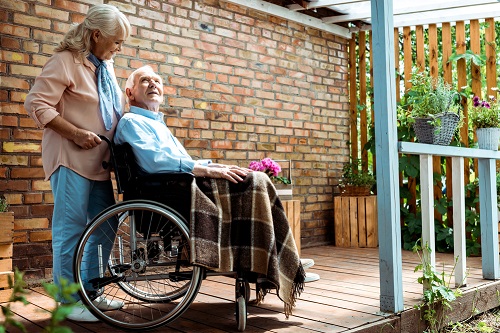
Are you trying to find the right assisted living facility (ALF) for your loved one or yourself? Are you overwhelmed by questions and unable to find the answers you need? Perhaps you are looking for answers to questions such as, ‘How does assisted living work? Who pays for your stay at the facility?’ You’ll find the answers to these questions and many others right here. We want to make it as simple as possible for you to transition from your home to assisted living.
People are living longer and finding ways to prolong their health so they can enjoy retirement. You or a loved one can find a wonderful retirement community that will make you feel at home, and meet all your care needs.
It’s becoming more important to find an assisted living facility that is a good match for your loved one and provides high-quality care. Doing your research upfront will help you make the best decision before your loved one moves in. It is possible to visit multiple care facilities and compare them on many essential aspects.
Take a moment to review some of the most frequently asked questions about assisted living facilities.
What is Assisted Living?
Assisted living is a care solution that enables seniors to maintain their independence while receiving personalized, 24-hour assistance. From helping with daily activities like meal preparation and housekeeping to providing social support when needed – ALFs strive to provide the best possible quality of life for elderly individuals in need of extra help maintaining an active lifestyle.
ALFs can be divided into two main categories: homes for the elderly and continuing care retirement communities. There is a primary difference between these two types- whether or not there is nursing care. Many homes for the elderly don’t offer nursing care. Continuity-care retirement communities often provide on-site nursing care. Seniors who require some assistance, but not very demanding medical care, will find it helpful to live in assisted living homes.
There are many levels of care that differ from one ALF. The look and feel of different facilities can vary. While some assisted living facilities look more formal and institutional, others feel more homey and comfortable. Some facilities are simpler than others. There are many factors that can affect the number of residents within a community or facility. One ALF may have 50 residents, while another could have hundreds.
As you look at all the options available, you will likely find differences among individual facilities, even within the same neighborhood. Even the types of buildings can vary. Condos and assisted living apartments are very common. Some places have large houses or institutions (ex. schools) that were converted to assisted living facilities.
Assistive living in Myrtle Beach is for seniors who wish to live as independently as they can but require assistance with daily activities. The staff and management strive to make residents feel as comfortable as possible. In order to avoid any need to move into a nursing home, staff and management aim to increase independence.
What is the difference between Assisted Living and Nursing Home care?
How can you decide which option is best for your loved one when it comes to nursing home care vs assisted living? As you can tell, assisted living residents are more independent and do not require constant care. Assistive living residents are more mobile than those in a traditional home and they don’t need to be bedridden. They often have their own apartments or living quarters.
Nursing home residents, on the other hand, have smaller rooms that can be shared or private with a roommate. Nursing home residents also require more medical and nursing care. Nursing homes tend to be more costly than assisted living facilities.
Find out more about the differences between senior living facilities and nursing homes.
What is the best time for seniors to move into assisted living facilities?
Many seniors and their families have the same question: When is it appropriate to move into assisted living? It’s not always easy to answer. It depends more on your needs than your age. Despite this, the 2014 CDC report found that assisted living residents were less than half the age of the following:
- Ages 65-74: 10.4 percent
- Age range 75-84 years: 29.9%
- 55 and over: 52.6 percent
Most seniors have had a caregiver or several caregivers helping them in their own homes before they move into an assisted living facility. These caregivers could include spouses, friends, and/or home health aides. Talks about moving into an ALF might be necessary if your loved one’s home care becomes too difficult. If your safety and well-being are at stake, you may need to consider an ALF.
 Here are some things to keep in mind when deciding if it is time for you, or your family member, to move into an ALF.
Here are some things to keep in mind when deciding if it is time for you, or your family member, to move into an ALF.
Safety in the home: Do you have concerns about stovetops being left on? Are you having more serious and frequent falls?
Personal health is deteriorating: Are you or your loved ones finding it more difficult to recover from flu and colds? Are there any chronic conditions or diseases that are getting worse?
Growing care needs: Does your loved one need assistance in getting dressed, taking medication, and getting to and from appointments or social events?
Cognitive decline: Is your loved one struggling to follow instructions or make decisions? Do you need constant reminders?
Inadequate nutrition: Is your family member losing weight due to the inability to buy groceries or make meals? Are you gaining weight because of eating unhealthy foods, or poor management of diseases like diabetes?
Poor personal hygiene: Does your loved one not brush their teeth or bathe on a regular basis anymore? Do they regularly wear dirty clothes?
Social interaction is lacking: Does your family member not get out of the house anymore to meet friends or other social groups?
Unable to manage finances: Does your loved one have a lot of unopened mail, bills, collections letters, or thank you letters from charities?
Poor driving skills: Have you observed an increase in close calls, fender benders, and traffic violations among those you love? Have you ever ridden along with your loved one and noticed things such as failure to use a seatbelt, or driving too fast or slow?
Inability to manage the house: Are you finding things like rotten food on the counters or in your home, the trash that needs to be removed, spills that require cleaning up, piles of clutter, malnourished pets, overgrown yards, neglected home repairs, and increasing amounts of clutter?
Many of the above points will be referred to by ALF staff when they go through the criteria to allow assisted living. A final consideration is whether your loved one has Alzheimer’s or dementia. Seniors with dementia often wander, become more confused and exhibit aggressive or agitated behavior as they age. These changes often indicate the need for seniors to be admitted to an ALF or nursing facility.
ALFs and nursing homes are embracing the reality of dementia patients, dedicating more units to this cause. The Alzheimer’s Association predicts that in 2039 there will be 5.8 million Americans struggling with memory-related diseases; a number that could skyrocket up to 14 million by 2050 – primarily affecting seniors living in our country today.
It is important to consider the changing care needs of your loved ones as you evaluate their care needs. When their cognitive or physical impairments get more severe, some elderly residents may need to be moved to nursing homes.
What are the differences in assisted living facilities?
The regulations governing assisted living facilities are mostly at the state level, rather than at the federal level. Some of the services and care that are offered by licensed ALFs may vary from one state to another. Keep in mind, however, that not all assisted-living facilities are state licensed. To find out what services are required in licensed facilities, you can contact your state’s Department of Human Services. Find out how many full-time and part-time staff are required per resident. You should be able to identify your state’s quality standards and the processes for monitoring or enforcing regulations.
All ALFs must comply with the Americans with Disabilities Act and the Fair Housing Act. Safety and fire regulations must also be met by assisted living facilities. You will also find that the amenities and services offered by assisted living facilities for elderly people are often quite different.
Many activities in assisted living communities are water-based because they are located near water bodies. Others might be focused on activities like golf. Some communities are pet-friendly, while others are more focused on certain cultures, languages, religions, or dietary requirements. An amenities list can include:
- Commercial kitchens
- Dining rooms
- Bistros, restaurants, and coffee shops
- Spas and salons
- Swimming pools
It is important to consider the care levels when considering assisted living. As we have already mentioned, assisted living dementia care has become more important. Special care units (SCUs) are often provided by ALFs offering dementia care. A specific floor or wing will be used for residents with dementia in a facility like this. There will be many features such as motion sensors, alarms, and automatic locking doors. You can also find extra staff and various types of activities. ALFs can be designed to provide care for all stages of dementia. Another may only be available for those who are at the beginning stages.
It is important to understand the different levels and types of services offered by ALFs. You want to ensure that your loved one enjoys the facility and receives the appropriate care. The CDC report examined ALFs and the care they provided to give an overview of the available options. Check out the 2014 findings, which show the percentage of ALFs offering the services that were covered by the study.
- Dementia care: 12 percent
- Social work services: 48 percent
- 52 percent of the population receives counseling or mental health services.
- Dental services: 54%
- Skilled nursing and nursing services: 59 percent
- Hospice services: 62 percent
- Therapeutic services: 62 percent
- Services in podiatry: 74%
- Pharmacy and pharmacist services: 82 percent
- Depression screening: 83 percent
Call Reflections Assisted Living at Carolina Forest now if you’re looking for the best assisted living facility in Myrtle Beach.
Like our Facebook page for more great info about senior living.
Reflections Assisted Living at Carolina Forest
219 Middleburg Dr
Myrtle Beach, SC 29579
(843) 903-0700
https://www.reflectionsassistedliving.com/







